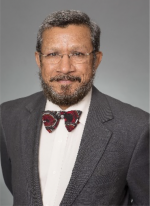Expanding Boundaries Through Telehealth Technology
January 30, 2020
Please join us in a thought-leadership discussion during our annual workshop, networking reception and winter dinner. This year we are hosting industry experts who will discuss elements of Telehealth Technology.
Proximity Hotel
704 Green Valley Road
Greensboro, NC 27408
Cost:
- $35 – Healthcare Providers (works in a facility that provides direct patient care) & Students
- $80 – Vendors / Consultants/Non-Providers
- $0 – Qualified Sponsor (included in sponsorship)
A 10% discount is applied for NC HIMSS Members.
Early Registration Deadline: January 20, 2020
1:30 pm
Registration Open
2:00 pm – 2:30 pm

Using Telepsychiatry to Enhance Access to Evidence-Based Care
Sy Saeed, MD, North Carolina Statewide Telepsychiatry Program
Many people with mental disorders do not have access to psychiatric services due to the shortage and maldistribution of providers, especially psychiatrists. This has resulted in patients going to hospital emergency departments to seek services resulting in long lengths of stay and boarding of psychiatric patients in hospital emergency departments. A growing body of literature now suggests that the use of telepsychiatry to provide mental health care has the potential to mitigate the workforce shortage that directly affects access to care, especially in remote and underserved areas. The North Carolina Statewide Telepsychiatry Program (NC-STeP) was developed to assure that if an individual experiencing an acute behavioral health crisis enters an emergency department of a hospital anywhere in the state of North Carolina, they receive timely, evidence-based psychiatric treatment through this program.
Sy Saeed, MD, is chair of the Dept. of Psychiatry and Behavioral Medicine at the Brody School of Medicine, East Carolina University. He also serves as the director of the Center for Telepsychiatry at ECU. He is the founding director of the North Carolina Statewide Telepsychiatry Program (NC-STeP), a state-funded program covering over 65 hospitals and community-based sites in North Carolina. Dr. Saeed has published extensively in the areas of evidence-based practices; anxiety and mood disorders, telepsychiatry, psychiatric administration and leadership, and psychiatric treatment integration. He has lectured and presented nationwide and internationally, including at the White House. Dr. Saeed was the 2019 recipient of the prestigious Gov. Oliver Max Gardner Award, the highest UNC award, selected by the UNC Board of Governors, to recognize UNC system faculty who have “made the greatest contribution to the welfare of the human race.”
2:30 pm – 3:00 pm

The FCC’s Healthcare Connect Consortium in NC
John Graham, Ph.D., NC Telehealth Network Association
The FCC has long understood the importance of high-quality broadband for healthcare providers, particularly for rural providers. To this end, they have dedicated funds from their Universal Services Fund to subsidize broadband subscriptions, particularly for non-profit rural providers. The NCTNA recognized this opportunity for NC’s healthcare providers and over its tenure, has secured over $35m in discounts for its healthcare providers. This presentation will review the history, challenges, and prospects going forward for NCTNA.
John Graham, Ph.D., is the Consortium Development director and board chair of NCTNA. Previous roles include senior investigator at the UNC-CH Gillings School for Global Public Health and deputy director for the NC Institute for Public Health, where he initiated several projects on healthcare digitization and information exchange. He is a past recipient of the Robert E. Bryan Public Service Award at UNC and the Public Leadership Award from the North Carolina Technology Association.
3:00 pm – 3:30 pm

The Intersection of Telehealth & Primary Care in NC: What Works Well & Where We Are Struggling
Steve North, MD, MPH, FAAFP, Medical Director, Eleanor Health
The use of telehealth continues to grow across the state of North Carolina in traditional healthcare settings, innovative startups, and insurer funded virtual visits. While we may be improving access to care, are we improving the overall quality of the care? This presentation will discuss what is working, what is not working, and how we can collaborate to ensure that patients are receiving the highest quality of care possible across our state.
Steve North, MD, MPH, FAAFP, is the medical director of Eleanor Health. A family physician and adolescent medicine specialist, he has been treating opioid use disorders in his practice since 2012. Dr. North is a nationally recognized expert in using telehealth in schools and primary care. Throughout his career, he has embraced the biopsychosocial model, an approach to caring for patients that considers the complex interaction of physical health, mental health, and the strength of their homes and communities when working with each patient. Dr. North serves on the boards of the Foundation for Health Leadership and Innovation and Advocates for Youth.
3:30 pm – 3:45 pm
3:45 pm – 5:00 pm
5:00 pm – 6:00 pm
Break
Interactive Q&A Panel Discussion
Networking Reception
6:00 pm – 7:30 pm

Dinner with Keynote Presentation – From Precision Medicine to Precision Policy: Learning from Big Data
Jessie Tenenbaum, Ph.D., Chief Data Officer, DHHS
Big data has changed the biomedical landscape from research to clinical care to population health. Dr. Tenenbaum will describe the “learning health system” paradigm in which clinical data is used to inform research. She will illustrate the approach with examples from top academic medical centers leveraging electronic health record data to stratify patients populations. She will also describe the North Carolina’s Healthy Opportunities pilots, which aim analogously to develop a “learning Department of Health and Human Services,” using data generated in the course of providing services to inform health policy. Finally, the speaker will contextualize these approaches by addressing the important ethical, legal, and social issues that they raise.
Jessie Tenenbaum, Ph.D., serves as the chief data officer for DHHS, where she oversees data governance, enabling the use of information to inform and evaluate policy and improve the health and well-being of residents of North Carolina. She was a founding faculty member of the Division of Translational Biomedical Informatics within Duke University’s Department of Biostatistics and Bioinformatics, where her research focused on informatics methods to enable precision medicine, particularly in mental health. She is also interested in ethical, legal, and social issues around big data and precision medicine. Nationally, Dr. Tenenbaum is a board member of the American Medical Informatics Association. She serves on the Board of Scientific Counselors for the National Library of Medicine as well as several editorial and advisory boards, including Nature Scientific Data and Briefings in Bioinformatics.



